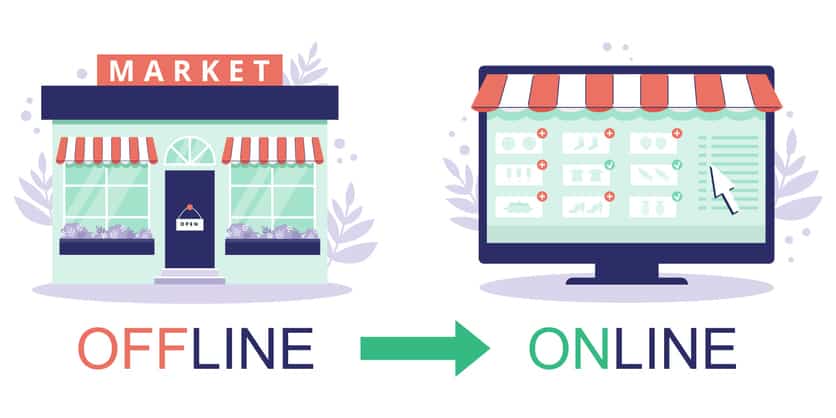The Covid-19 lockdown made moving businesses online important, as people looked for better ways to get their supplies while staying safe.
Fast forward, and it’s clear that online selling won’t fade even as more physical stores open. Shoppers experienced this quick and convenient method of buying goods and formed a habit. Sellers, on the other hand, saw the real advantages of online selling.
The opening of malls and other business establishments can’t change that now. Instead, market players have more options on where to buy and sell their products.
Why should you bring your business online?

Online selling now has almost the same, if not a bigger, potential to maximize profits as in-store sales. However, it all depends on whether this ecommerce will suit your small business’ needs better.
We’ve listed the advantages and disadvantages of selling online to help you decide.
Advantages of online selling
Ease of entry
If you haven’t already set up your shop online, you’ll find that doing so is fairly easy, even when you aren’t very tech-savvy. You can use any of the readily available store builders or marketplace tools to start your digital storefront.
Here are the Top Ecommerce Website Builders to Use
Save on operational costs
Compared to running a physical store, which requires a sizable investment in leased commercial space, in-person store workers, and logistics to keep inventory replenished, online stores are significantly more cost-efficient, operation-wise.
Your biggest hurdle would be finding a good courier partner to move your product safely and efficiently to your buyers.

and gives you better flexibility.
You can sell 24/7
A digital storefront comes with the advantage of being able to set up technologies like chatbots and forms that can register orders made outside of regular, physical store hours. You’d literally sell products even as you sleep!
Here’s an easy step-by-step guide on Creating Facebook Messenger Chatbot
Customer convenience
If a majority of your target market has access to the internet, then creating a digital storefront would be beneficial. Access to your online store means buyers can save on the time and effort of going to your physical store.
Wider reach
A digital store trumps a physical store’s performance when reaching a wider audience. With the internet connecting everyone online, you can market and sell your products and services even if you’re in another city or country.
Access to consumer insights and data
As you track sales online, you gain datasets and valuable insights as to your buyers’ preferences. This knowledge can help you anticipate when a high volume of orders will likely come in and prepare accordingly.

so you can reach and engage more customers.
Retarget and remarket
Customers don’t always check out the items on their virtual cart. But unlike an abandoned grocery cart in a physical store, online sellers have a way to nudge buyers into completing the purchase.
You can show related ads to items they’ve already shown interest in and follow up on the latest budol. This is the power of retargeting.
Learn How to Convert Your Almost-Customers through retargeting.
Potential for fast growth
Once you hit your stride in the online selling business and find a loyal consumer base, you can accelerate your business growth. It all boils down to the other factors listed above coming together to create an excellent opportunity for your products to reach even more customers.
Disadvantages of selling online
Touch-and-feel marketing is out
All kinds of sensory input, not just sight, play a part in selling a product. Many stores depend on the smell of their products to catch the attention and lure in customers. Others may sell a product that feels great to the touch. It’s hard to translate the entirety of a unique physical experience through just images and text.
If your business uses the senses to close the sale, consider leaning more on your physical store. Your store could then direct customers to your ecommerce website for repeat purchases.
Not everyone has good internet access
Let’s be real. The Philippines doesn’t have the best infrastructure for internet access. If you’re considering selling online, the first thing you want to ask yourself is if your customers would even have the means to find you in the digital space.
If your target buyers aren’t online, then you wouldn’t be doing yourself a favor by tucking your store away somewhere inaccessible to them.

Physical stores create credibility
While online stores are easy to establish and convenient, physical stores make a statement. It gives the impression of something established and tangible, and therefore trustworthy.
If you want to create an impression of stability around your brand, investing in a physical location would help your business, but setting up a digital storefront is also a way to expand your reach to online buyers.
Prone to fraud and security issues
We’ve made strides in keeping cybercriminals from running scams online, but it doesn’t mean they won’t keep trying.
Fraud-related crimes are a problem when selling online. So be sure to incorporate good security measures against fraudsters. Your buyers will appreciate the extra effort and feel more secure about transacting with you again.
Tech up and Protect Your Ecommerce Website from Online Threats
There’s low brand loyalty
Since online selling is fairly easy to get into, it’s to be expected that other people have the same idea or developed a similar product to yours. Online consumers are spoiled for options so their money usually goes to which seller can give them the best deal. Brand loyalty is something that your business should cultivate intentionally.
Shipping can take time
Customers will have to wait for their orders to be processed and packed, shipped and delivered. Not everyone is a fan of the wait so shopping online, even with a next-day delivery option, might keep them from flocking to your store.
#NinjaTip: Your online shop should have a reliable courier partner for hassle-free deliveries. Ninja Van has a range of services for different types of businesses with different needs — from small online sellers to SMEs and Enterprise level.
ONLINE shopping has become a habit for many Filipinos. It’s here to stay. So, if you’re thinking about starting a small business or have already started one, take heart. There’s definitely an opportunity for you there.

Just keep in mind that this business model works best for a certain type of product and target market. If you think that your plan has more pros than cons (or you can get around them), then get selling digitally!






